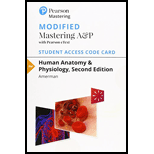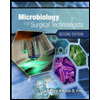
Modified Masteringa&p With Pearson Etext -- Standalone Access Card -- For Human Anatomy And Physiology
2nd Edition
ISBN: 9780134788074
Author: AMERMAN, Erin C.
Publisher: Pearson Education Canada
expand_more
expand_more
format_list_bulleted
Question
Chapter 20, Problem 9CYR
Summary Introduction
To review:
The given blank spaces in the statement, “Injured tissue releases chemicals called _____ that mediate four cardinal signs of inflammation, which are ____, _______, ______, and ______.”
Introduction:
Tissue injuries can be caused because of various factors, such as strain, sprain, overuse, and one-off blow. These blows can also result in contusions. The early players in the case of tissue injuries are not immune cells, but fibroblasts, which activate
Expert Solution & Answer
Want to see the full answer?
Check out a sample textbook solution
Students have asked these similar questions
HAND DRAW
There should be two pro
Molecular Biology Question. Please help solve. Thanks.
Please draw how two nucleotide triphosphates are linked together to form a dinucleotide, and label the 5' and 3' ends of the resulting dinucleotide.
What is a reversion in molecular biology?
Chapter 20 Solutions
Modified Masteringa&p With Pearson Etext -- Standalone Access Card -- For Human Anatomy And Physiology
Ch. 20.1 - What are the main functions of the lymphatic...Ch. 20.1 - 2. How do lymphatic capillaries differ from blood...Ch. 20.1 - What is the pathway of lymph flow from the right...Ch. 20.1 - 4. What main cell types are located in lymphoid...Ch. 20.1 - List the main functions of MALT, lymph nodes, the...Ch. 20.2 - 1. How do innate immunity and adaptive immunity...Ch. 20.2 - 2. What are the three lines of defense?
Ch. 20.2 - What are the bodys main surface barriers, and how...Ch. 20.2 - Prob. 4QCCh. 20.2 - How are the immune system and lymphatic system...
Ch. 20.3 - Match the following cell types with their correct...Ch. 20.3 - Which of the cells in question 1 do not directly...Ch. 20.3 - What is the complement system, and what are its...Ch. 20.3 - In what two ways is the complement system...Ch. 20.3 - 5. What are the main cytokines of innate...Ch. 20.3 - What are the four cardinal signs of inflammation?Ch. 20.3 - 7. What are inflammatory mediators, and what do...Ch. 20.3 - Explain the role of phagocytes in the inflammatory...Ch. 20.3 - What causes the elevated temperature and common...Ch. 20.3 - Prob. 10QCCh. 20.4 - 1. What are MHC molecules?
Ch. 20.4 - 2. How do class I and class II MHC molecules...Ch. 20.4 - How are T cells activated?Ch. 20.4 - Prob. 4QCCh. 20.4 - What are the main functions of TC cells?Ch. 20.4 - Prob. 6QCCh. 20.4 - Prob. 7QCCh. 20.5 - 1. How is a B cell activated?
Ch. 20.5 - Prob. 2QCCh. 20.5 - What are the five classes of antibody, and how do...Ch. 20.5 - 4. List the five main functions of antibodies.
Ch. 20.5 - How do the primary and secondary immune responses...Ch. 20.5 - 6. What is the purpose of a vaccination, and what...Ch. 20.5 - 7. How do active immunity and passive immunity...Ch. 20.6 - How do innate immunity and adaptive immunity work...Ch. 20.6 - Walk through the basic steps of the immune...Ch. 20.6 - How does the immune system survey the body for...Ch. 20.6 - Walk through the steps of the immune response to...Ch. 20.6 - Prob. 5QCCh. 20.6 - 6. How do cancer cells escape the immune response...Ch. 20.7 - Define the four types of hypersensitivity...Ch. 20.7 - Explain how type IV hypersensitivity differs from...Ch. 20.7 - How do primary and secondary immunodeficiency...Ch. 20.7 - Prob. 4QCCh. 20.7 - What is an autoimmune disorder? What produces the...Ch. 20.7 - 6. What are the potential causes of autoimmune...Ch. 20 - 1. Which of the following is not a function of the...Ch. 20 - Mark the following statements as true or false. If...Ch. 20 - Fill in the blanks: The lymphoid organ that...Ch. 20 - Fill in the blanks: Nonspecific immunity is also...Ch. 20 -
5. Which of the following make up the body’s...Ch. 20 - Which of the following does not describe the...Ch. 20 - Mark the following statements as true or false. If...Ch. 20 - Which of the following functions is/are performed...Ch. 20 - Prob. 9CYRCh. 20 - 10. When naïve B cells are activated, they...Ch. 20 - 11. Match the following antibodies with the...Ch. 20 - Mark the following statements as true or false. If...Ch. 20 - Prob. 13CYRCh. 20 - On which type(s) of cells are class I MHC...Ch. 20 - Fill in the blanks: Class I MHC molecules display...Ch. 20 - 16. Which of the following is not a role of TH...Ch. 20 - 17. Mark the following statements as true or...Ch. 20 - 18. Type I hypersensitivity is due to release of...Ch. 20 - Prob. 19CYRCh. 20 - Prob. 20CYRCh. 20 - Prob. 1CYUCh. 20 - Complement proteins are crucial for stimulating...Ch. 20 - 3. Terrence has severe asthma and allergies, and...Ch. 20 - Your friend tests her snake-wrangling skills on an...Ch. 20 - 2. Carla presents to her physician with a...Ch. 20 - 3. Mr. White has been diagnosed with febrile...Ch. 20 - Mr. White developed neutropenia as a consequence...Ch. 20 - 5. The chemotherapeutic drugs Mr. White is taking...
Knowledge Booster
Similar questions
- What is a gain of function mutation?arrow_forwardMolecular Biology Question: Please help. Thank you Is Southern hybridization's purpose detecting specific nucleotide sequences? How so?arrow_forwardUse the following information to answer the question(s) below. Martin Wikelski and L. Michael Romero (Body size, performance and fitness in Galápagos marine iguanas, Integrative and Comparative Biology 43 [2003]:376-86) measured the snout-to-vent (anus) length of Galápagos marine iguanas and observed the percent survival of different-sized animals, all of the same age. The graph shows the log snout-vent length (SVL, a measure of overall body size) plotted against the percent survival of these different size classes for males and females. Survival (%) 100- 80- 60- 40- 20- 0+ 1.9 T 2 2.1 2.2 2.3 2.4 2.5 2.6 2.7 Log SVL (mm) 19) Examine the figure above. What type of selection for body size appears to be occurring in these marine iguanas? A) directional selection B) stabilizing selection C) disruptive selection D) You cannot determine the type of selection from the above information. 3arrow_forward
- 24) Use the following information to answer the question below. Researchers studying a small milkweed population note that some plants produce a toxin and other plants do not. They identify the gene responsible for toxin production. The dominant allele (T) codes for an enzyme that makes the toxin, and the recessive allele (t) codes for a nonfunctional enzyme that cannot produce the toxin. Heterozygotes produce an intermediate amount of toxin. The genotypes of all individuals in the population are determined (see table) and used to determine the actual allele frequencies in the population. TT 0.49 Tt 0.42 tt 0.09 Refer to the table above. Is this population in Hardy-Weinberg equilibrium? A) Yes. C) No; there are more homozygotes than expected. B) No; there are more heterozygotes than expected. D) It is impossible to tell.arrow_forward30) A B CDEFG Refer to the accompanying figure. Which of the following forms a monophyletic group? A) A, B, C, and D B) C and D C) D, E, and F D) E, F, and Garrow_forwardMolecular Biology Question. Please help with step solution and explanation. Thank you: The Polymerase Chain Reaction (PCR) reaction consists of three steps denaturation, hybridization, and elongation. Please describe what occurs in the annealing step of the PCR reaction. (I think annealing step is hybridization). What are the other two steps of PCR, and what are their functions? Next, suppose the Tm for the two primers being used are 54C for Primer A and 67C for Primer B. Regarding annealing step temperature, I have the following choices for the temperature used during the annealing step:(a) 43C (b) 49C (c) 62C (d) 73C Which temperature/temperatures should I choose? What is the corresponding correct explanation, and why would I not use the other temperatures? Have a good day!arrow_forward
- Using the data provided on the mean body mass and horn size of 4-year-old male sheep, draw a scatterplot graph to examine how body mass and horn size changed over time.arrow_forwardPlease write a 500-word report about the intake of saturated fat, sodium, alcoholic beverages, or added sugar in America. Choose ONE of these and write about what is recommended by the Dietary Guidelines for Americans (guideline #4) and why Americans exceed the intake of that nutrient. Explain what we could do as a society and/or individuals to reduce our intake of your chosen nutrient.arrow_forwardWrite a 500-word report indicating how you can change the quantity or quality of TWO nutrients where your intake was LOWER than what is recommended by the Dietary Guidelines for Americans and/or the DRIs. Indicate how the lack of the nutrient may affect your health. For full credit, all of the following points must be addressed and elaborated on in more detail for each nutrient: The name of the nutrient At least 2 main functions of the nutrient (example: “Vitamin D regulates calcium levels in the blood and calcification of bones.”) Your percent intake compared to the RDA/DRI (example “I consumed 50% of the RDA for vitamin D”) Indicate why your intake was below the recommendations (example: “I only had one serving of dairy products and that was why I was below the recommendations for vitamin D”) How would you change your dietary pattern to meet the recommendations? – be sure to list specific foods (example: “I would add a yogurt and a glass of milk to each day in order to increase my…arrow_forward
- Why are nutrient absorption and dosage levels important when taking multivitamins and vitamin and mineral supplements?arrow_forwardI'm struggling with this topic and would really appreciate your help. I need to hand-draw a diagram and explain the process of sexual differentiation in humans, including structures, hormones, enzymes, and other details. Could you also make sure to include these terms in the explanation? . Gonads . Wolffian ducts • Müllerian ducts . ⚫ Testes . Testosterone • Anti-Müllerian Hormone (AMH) . Epididymis • Vas deferens ⚫ Seminal vesicles ⚫ 5-alpha reductase ⚫ DHT - Penis . Scrotum . Ovaries • Uterus ⚫ Fallopian tubes - Vagina - Clitoris . Labia Thank you so much for your help!arrow_forwardRequisition Exercise A phlebotomist goes to a patient’s room with the following requisition. Hometown Hospital USA 125 Goodcare Avenue Small Town, USAarrow_forward
arrow_back_ios
SEE MORE QUESTIONS
arrow_forward_ios
Recommended textbooks for you
 Human Biology (MindTap Course List)BiologyISBN:9781305112100Author:Cecie Starr, Beverly McMillanPublisher:Cengage Learning
Human Biology (MindTap Course List)BiologyISBN:9781305112100Author:Cecie Starr, Beverly McMillanPublisher:Cengage Learning Human Heredity: Principles and Issues (MindTap Co...BiologyISBN:9781305251052Author:Michael CummingsPublisher:Cengage Learning
Human Heredity: Principles and Issues (MindTap Co...BiologyISBN:9781305251052Author:Michael CummingsPublisher:Cengage Learning Microbiology for Surgical Technologists (MindTap ...BiologyISBN:9781111306663Author:Margaret Rodriguez, Paul PricePublisher:Cengage Learning
Microbiology for Surgical Technologists (MindTap ...BiologyISBN:9781111306663Author:Margaret Rodriguez, Paul PricePublisher:Cengage Learning Medical Terminology for Health Professions, Spira...Health & NutritionISBN:9781305634350Author:Ann Ehrlich, Carol L. Schroeder, Laura Ehrlich, Katrina A. SchroederPublisher:Cengage Learning
Medical Terminology for Health Professions, Spira...Health & NutritionISBN:9781305634350Author:Ann Ehrlich, Carol L. Schroeder, Laura Ehrlich, Katrina A. SchroederPublisher:Cengage Learning Human Physiology: From Cells to Systems (MindTap ...BiologyISBN:9781285866932Author:Lauralee SherwoodPublisher:Cengage Learning
Human Physiology: From Cells to Systems (MindTap ...BiologyISBN:9781285866932Author:Lauralee SherwoodPublisher:Cengage Learning

Human Biology (MindTap Course List)
Biology
ISBN:9781305112100
Author:Cecie Starr, Beverly McMillan
Publisher:Cengage Learning


Human Heredity: Principles and Issues (MindTap Co...
Biology
ISBN:9781305251052
Author:Michael Cummings
Publisher:Cengage Learning

Microbiology for Surgical Technologists (MindTap ...
Biology
ISBN:9781111306663
Author:Margaret Rodriguez, Paul Price
Publisher:Cengage Learning

Medical Terminology for Health Professions, Spira...
Health & Nutrition
ISBN:9781305634350
Author:Ann Ehrlich, Carol L. Schroeder, Laura Ehrlich, Katrina A. Schroeder
Publisher:Cengage Learning

Human Physiology: From Cells to Systems (MindTap ...
Biology
ISBN:9781285866932
Author:Lauralee Sherwood
Publisher:Cengage Learning